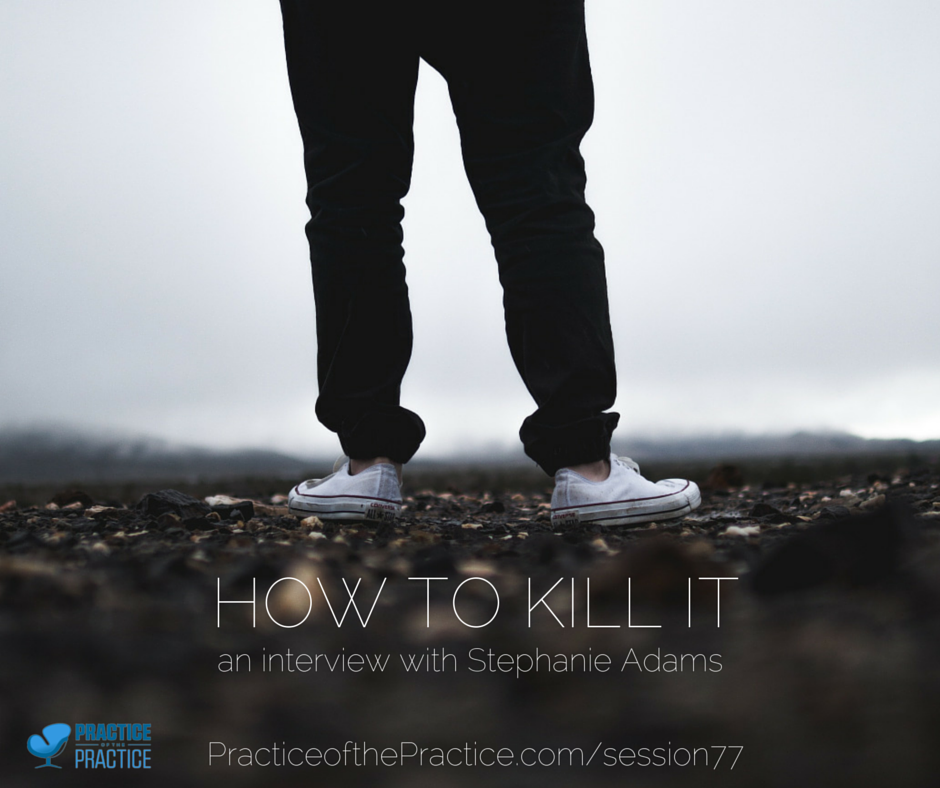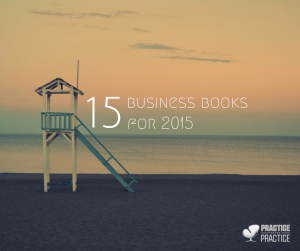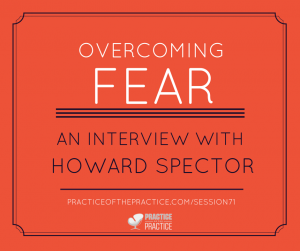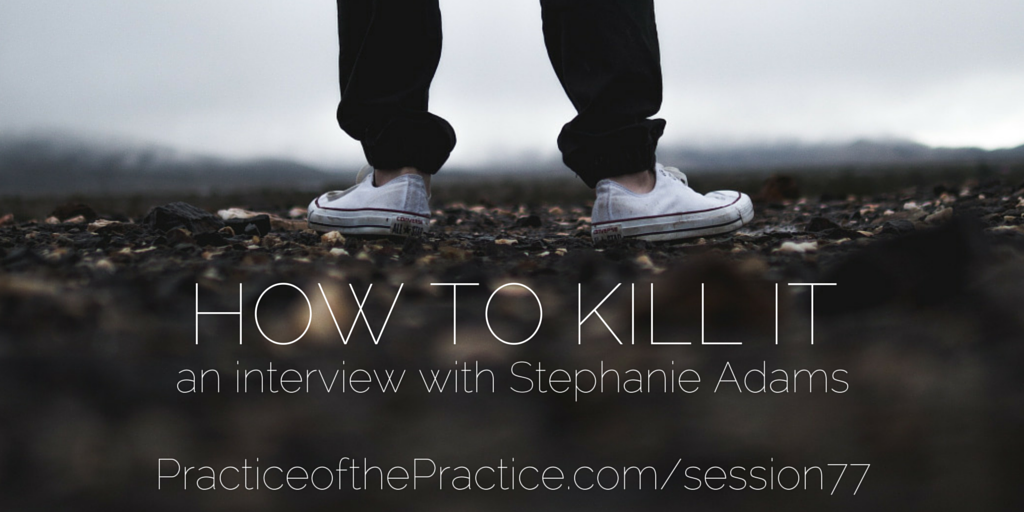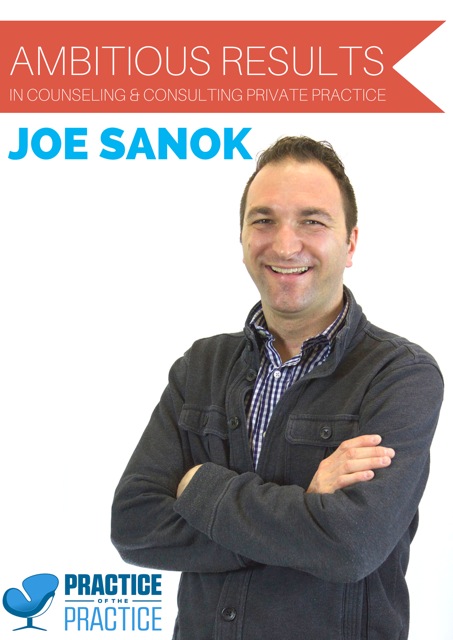Podcast: Play in new window | Download | Embed
AWEBER, MAKE EMAIL EASIER
TRY IT FOR $1
Today’s Private Practice Podcast Resource
What you will discover in this podcast
2:10 How buying the first round of drinks makes me money.
4:42 How to use email to grow clients.
11:37 How Stephanie uses her time, to get more time and money.
18:52 Switching URLs and not losing clients.
PoP Culture Meet Stephanie Adams
 I met Stephanie Adams at the 2015 ACA conference. She did a breakout session titled: Practice for Profit: Charge What You’re Worth and Fill Your Appointment Book By Dropping Your Money Issues. Stephanie is helping counselors that are early in their practice. Here website MBA in Private Practice continues to grow resources for counselors as well.
I met Stephanie Adams at the 2015 ACA conference. She did a breakout session titled: Practice for Profit: Charge What You’re Worth and Fill Your Appointment Book By Dropping Your Money Issues. Stephanie is helping counselors that are early in their practice. Here website MBA in Private Practice continues to grow resources for counselors as well.
Check out what she’s giving us for free! Just click the image below.
Podcasts you may have missed
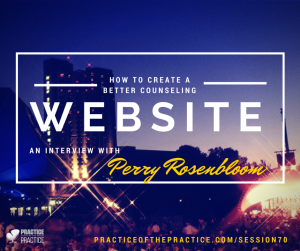
Music From The Podcast
Silence is Sexy
Bellevue
For your social media
Joseph R. Sanok, MA, LLP, LPC, NCC
Joe Sanok is an ambitious results expert. He is a private practice business consultant and counselor that helps small businesses and counselors in private practice to increase revenue and have more fun! He helps owners with website design, vision, growth, and using their time to create income through being a private practice consultant.
Joe was frustrated with his lack of business and marketing skills when he left graduate school. He loved helping people through counseling, but felt that often people couldn’t find him. Over the past few years he has grown his skills, income, and ability to lead others, while still maintaining an active private practice in Traverse City, MI.
To link to Joe’s Google+ .
Here is the Transcription of This Podcast
How to help new counselors An interview with Stephanie Adams
This is the Practice of the Practice Podcast with Joe Sanok, Session 77. I’m Joe Sanok, your host, and thank you so much for tuning in today. I know that your time is really valuable. And so today’s interview is Stephanie Adams, I think, is going to provide you with so much value.
Before we get to that, I want to tell you a story. So last night, I hosted an event called, “The Path to LPC”. So in Michigan, the way our licensure is structured is, after you graduate, you can apply to be an LLPC, and so that’s a limited license professional counselor. And then after two years, you can apply to be an LPC, and you have to pass the NCE and things like that.
So there are a few steps in between there though, that get kind of messy. So for example, you graduate, and to get your license, you have to already have a supervisor, but a lot of people are hoping to get their license and get a job and get their supervision covered for them through that job. But you have to be licensed first. So this is like catch-22 for new graduates. Sorry, I don’t have my cup of coffee in my hand. Hold on just a second.
How buying the first round of drinks makes me money
So anyway, I’ve been hosting this event called, “The Path to LPC”, and it’s aimed at graduate students, people that are in grad programs, typically in their last semester, but anyone can come that’s a grad student or even if people are LPCs, and I have my supervision group. People from that that are LLPCs, and then also, passed LLPCs or full LPCs come to the event. They’re just on a panel where we sit in a round table — or not a round table, sort of a circle, and we hang out at the Grand Traverse Yacht Club and look over the water. I got some like stuff to great leaves and olives and cheese and salami and ham and some fancy cookies, and bought everybody their first round of drinks.
And so I do this event that’s really helpful. Every year, people say, “Oh my gosh! This is stuff that should be just taught in one of our last classes in graduate school,” and it’s nothing against the grad schools, but helping new professionals not only helps them, and it’s just like the right thing to do, but it also directly helps me, because every year, I recruit a handful of people that are going to join my supervision group. And so as you’ll see through my monthly income reports that I make a significant amount of money through those supervision groups. So every month, depending on how many people are in it, I make between $600 and $1,000 through those supervision groups.
So spending $100 or even $200 for one evening a year, that’s a huge recruitment event, and also provides immense value to people. It’s just a really smart way to help grow a supervision kind of aspect. And one thing that I do is I require people’s emails, and that’s going to be my resource of the day is AWeber. So AWeber — excuse me. I love half-and-half of my coffee, and usually, we just have milk, and my wife surprised me with half-and-half this morning, so it’s just like a glorious morning. I did my PT this morning and started doing more aerobic workout, which is why I’m coughing because I got my butt kicked.
How to use email to grow clients
But anyway, my resource, my tool, my thing for private practice that is kind of our in place of sponsor this week is aweber.com, and I would love for you to check them out. Use my affiliate, if you don’t mind. That’s just practiceofthepractice.com/aweber, and that’s got one B, so it’s A-W-E-B-E-R, so practiceofthepractice.com/aweber. You can try it out for a month, but I’ve been using it for two or three years, and if you’re on my email list, you know how active I am with email. I just had someone email me and say, “Joe, your email seems so personalized. How do you have time for this?” Well, in AWeber, when someone signs up for your email list, so say you’re joining the Practice of the Practice email list — it’s totally free. Every week, you get an email for the first probably 20 weeks. You sign up, you start at email number one. So I say, “Dear,” and then there’s like a way you personalize it, and it’s, I think, “FName”, you click on this thing, and so it inserts the person’s first name. “Dear Sally,” or “Dear Anna,” because just emailed me and wanted to give her a shoutout.
So “Dear Anna,” and then it’s like, “I hope your week’s going great. Here’s what I’m talking about this week. Here are five ways to grow a social media,” so it’s really kind of helpful, and then I might end with, “Anna, I hope you join our Facebook group. We’d love to have you there. Have an awesome week, Joe.”
So it’s personalized, but if Anna signs up today for the email list and you signed up four weeks ago, Anna’s going to get email number one, you’re going to get email number five. So you prewrite these emails, and then you can also do something called, “The Broadcast”, and that’s an email that just goes out to everybody.
So with this group, this Path to LPC group, there are people that came three years ago to my first ever Path to LPC group that I put in to AWeber, sent out a broadcast to everybody, invited them to come, and then I’ve got people that are now professionals in the field that are fully licensed LPCs, I’ve got people that are LLPCs, I’ve got people that are in school, so I’m creating this community where I’m at the center. I’m the hub of this community, which then directly helps me be seen as a thought leader, as someone that’s kind of leading this tribe and getting people together.
And so check out AWeber. It’s super cool. And if it’s not AWeber, there are lots of email services out there that people use, but I really just think AWeber integrates well, especially if eventually, you want to do any paid content, so like my premium newsletter, it integrates directly with PayPal. So when someone pays, they automatically get added to this paid E-newsletter. And so it’s just super cool.
So the reason I bring that up and I bring up the Path to LPC is because my guest today — excuse me. I still haven’t recovered from that cold I got at ACA. Darn you Orlando! No, I’m just kidding. It’s because Stephanie Adams is just this amazing counselor. She is an amazing private practice consultant and is doing a lot of just great work, especially with people that are newly licensed. And so I wanted to invite her on to just talk about that, to talk about creating community, because when I was down at ACA, she had this whole like cohort of people that just knew her, that were around her, that just followed her work, and really had gained so much as new counselors. And they’re continuing to just kind of create groups that are amazing and that are on Facebook in all sorts of ways. So I wanted to bring her on and have her talk a little bit about that, talk about her work, and hopefully teach us just about private practice and teach us about growing kind of groups of people that are interested in our work. She also spoke at ACA on private practice. She was in the private practice track, and she’s just doing really cool work.
So without any further ado, I give you Stephanie Adams.
Joe Sanok: Stephanie Adams, welcome to the Practice of the Practice podcast.
SA: Hello! Thanks for having me.
Joe Sanok: Oh, this is awesome. So I just went to your session here at ACA. It was all about money and having a better relationship with it and breaking up with insurance panels, and all sorts of things which we’ll get to in a minute, but I want to just hear like who are you so the people that don’t know you, they can hear a little bit of your story.
SA: Hey, thanks for the opportunity. My name is Stephanie Adams, of course, and I’ve been working with private practice counselors trying to help them really build their ideal practices and deal with things in themselves that are holding them back from growth and business, and connecting them with other therapists. So that’s been going on with the Mind Your Own Business Conference since 2013. I think it was our first year. We’re coming up on our third year in 2015, and it’s a big online community, and we just have that supporting other therapists in building our businesses together.
Joe Sanok: So tell me about the conference, because I think it’s such a cool idea, and a lot of other industries are doing online conferences. The counselors aren’t always the first to pick up on things. So the fact that this is a few years old, it’s really cool, because you’re ahead of most counselors. So tell me about the conference.
SA: Well, really, it’s been really super fun. I mean, I’m excited to see it grow again. The first year, we got a huge amount showed up and I think it doubled the second year. I think people love this kind of information shown by our great attendance of the ACA Conference where we are right now. The people love it, but they can’t always fly and they can’t always pay for the sessions and stuff, so I wanted to set up a free conference, you know, get other private practice experts I can interview on topics that they’re great at and they know really well, and we can all come together as a community, have structured events and activities. I think the people just wanted it. They were just ready for something like that.
Joe Sanok: So how does this structure work? Is it all day long, or is it over weekend, or how does the conference itself play out?
SA: Well, we’re adapting in every year to be better in tune with what they need. I think this year, we’re looking forward to six weeks of maybe twice a week sessions. I think we’ve done 21 days where it’s twice a week previously, and we’re just kind of playing around with it and get the right amounts, but we give you guys some time to develop relationships with the other counselors attending, because that’s some of the most important parts, is getting the people you need.
Joe Sanok: Yeah. So how did you go from just private practice, which you talked about, to wanting to do consulting? How did that transition happen?
SA: Well, I’m kind of a soap box person, I guess, because I started out — the background is I was a struggling intern. I didn’t know what to do next like many of us don’t, so I got frustrated and fed up and I wrote a book for new counselors called, “The Beginning Counselor’s Survival Guide”. And then kind of when I got in private practice and I realized how hard it was, and you know, even when I was starting out, there weren’t as many resources out there as thankfully there are now, and I just got frustrated, and I was like, “You know what? We need more business resources for being set up to fail,” and I’m not saying that’s an intentional thing or anybody’s doing that on purpose, but the situation is setting us up to fail, and I don’t want us to fail. We got into this for a reason.
Joe Sanok: Yeah.
SA: We’re just here to help people, and those people will miss out if we close our practices.
Joe Sanok: You shared a little bit in your session about when you moved back to Dallas and you kind of reassessed your practice, and I think that you made some really distinct choices you outlined in the session. Can you tell us about those choices? I think that’s where a lot of people are that are listening. So maybe describe what your practice was like and then the choices you made that really helped.
How Stephanie uses her time, to get more time and money
SA: Well, my private practice in another part of the State was very limited. It was not a huge hourly rate. It wasn’t very full, and I was having supplement through a nonprofit work, which I loved doing, but the same time, I wanted to grow my business. And then when we moved back to Dallas, I didn’t even have that nonprofit job to cushion it, which is kind of the good thing about getting backed into a corner sometimes, is that it pushes you to take action. And so I was like I have to get serious about it. There’s no way we can keep doing this.
So I quit insurance, and I’ll like to make clear. I think people can have healthy practices on insurance. I didn’t think my practice was going to be healthy on insurance. It was costing me too much in time. I was spending too much time, and time is not money. It’s a quote somebody said today. “It’s better value than money,” because you can make more money, you can’t get more time. I think that was Mariel Hemingway’s quote.
But anyway, all that came together and it was just not worth it, and I did some market research and I’ve narrowed my niche, and I raised my fees. And by market research, I mean I looked to a lot of other therapists what they were charging. I said, “I’m not going to be the lowest, and I’m not going to be the highest, I’m going to be in the middle,” and I built my practice that way.
Joe Sanok: Yeah. So was there a point when you moved closer to being the highest in your area like you kept raising your prices, or did you just kind of leave it in the middle?
SA: Right now, I’m staying where I’m at because it’s working for me. It’s keeping me where I need to be, but I think I might be on the higher end at this point for my niche, which is teens. I’m not 100% sure on that part, but I suspect it might be the case.
Joe Sanok: Now, you talked a lot about just our relationship with our money, and I think that’s something that at least on the website, a lot of people have addressed and talked about, and every month, I put my monthly income report on there. So I try to be really transparent about money. So tell me the hang-ups that people typically have around money and maybe where that comes from.
SA: Well, it’s interesting because I feel like we put it in a separate category, but it’s really just like any other clinical issue. What would you first do? Where’d that belief about money come from? What are your memories about it? What are your feelings? What did your parents tell you about it? We don’t ask those questions about money, but they’re just as relevant with any other topic you would bring up.
So that’s the kind of thing that I like to ask and then it might be something like you feel like it’s impolite. I made a joke because I’m a Texan, and in the South, sometimes, we just don’t want to talk about money because that’s impolite. You might feel like it’s something that makes you vulnerable. So I think it’s a difficult subject. You don’t want to feel like you’re choosing money over clients. None of us want to feel that way because we’re not here to do that. So I think people think it’s an either/or scenario.
Joe Sanok: I liked the question you asked in the session about like what’s your first memory of money, because I thought back and I remembered that we were going to Disney World when I was like three years old and my parents made me save up money for — and it was like — then I thought of like my second money memory, and I was like saving up for a skateboard, then my third one was saving up for something else. And so I realized that a lot of my own money memories was around saving and security and the freedom that comes with money. And so then thinking — hearing some people, “Well, my money issues are this and this,” I was just like, “Oh, that’s so not me,” because it was I think a rather healthy relationship, but then, when you see kind of how things progress afterwards, it’s you know, stayed kind of that healthy relationship, and it’s amazing how going back very early on defines how you view money in your private practice.
SA: It does, and I would really go as far as to say is that because you have those healthy good many memories has probably a lot to do with why you are where you are today in a healthy practice and taking care of yourself.
Joe Sanok: Yeah. I mean, there were times that I’ve had my brother, in particular, who’s a business consultant, challenged me on like raising my prices, but I was open to that challenge because it was like, “Oh, okay. That makes sense.”
SA: You didn’t have that hang-up.
Joe Sanok: Exactly. So when people recognized some of those hang-ups with money in their practice, like how do they start to address those?
SA: Well, the first thing is, don’t accept those as reality automatically. I think we just want to hide from them because we don’t realize you’re allowed to change those. So when that comes up, start to ask yourself, “Where is this coming from? Is this an automatic assumption that has validity? Does it come from some past belief about money that may or may not be accurate or applicable in this situation?” and just start to challenge it. And I feel like no matter what challenging, it gets you to the right point because either you’ll change the thing because if you realize, “Hey, this is really unethical. I really do need to change,” or going to go, “Wait a minute. Maybe this is a faulty money memory belief,” and go, “What if I reframe it?” So reframe is a good word, I think. Start to think about that and develop healthy money boundaries. Proactively ask yourself those questions and plan for it.
Joe Sanok: So what do you say to people that say, “I’m sick of insurance panels, but I feel like if I do that, then I’m excluding all these people out of my practice that financially just can’t pay my rates.” Like I know someone kind of brought that up in the session. Like what do you say to that?
SA: Well, I think everybody has to come to their own personal peace about it. I want you to just think about the fact that, “Is everybody else’s well-being your responsibility?” because we’re in a business where we have to make a profit. Without a profit, we’re dead. Does that mean we don’t care about those people? Absolutely not, but nonprofits and interns are set up to be able to offer lower rates. It’s a great system to be able to give people for your low-cost sessions, and we should develop relationships with those people. It’s not always our job. We can, and many therapists choose you. I do this, is you set aside a certain amount of low-rate sessions that you’re going to offer. You build it into your business plan and say you know. I kind of joke and call it “Build Your Own Socialism”. It’s like — okay, you charge this rate to almost everybody, but you give a few people maybe with that area you’re passionate about a certain situation that you really want to help. You can make exceptions, but you can’t take on everybody’s else’s money issues, not like any more that you could take on anybody else’s trauma history or whatever else they’re going through.
Joe Sanok: Yeah, and I think that’s an important point, because I know when I took insurance, there was one in particular insurance company that I got $53 per session. And they would only approve three sessions, and so it’s like — and then you’d spend you know, an hour on the phone getting reauthorizations or there would be a no show and/or you could $160 a session and give away four and still come out ahead. And I think the thinking through is really important.
SA: It is.
Joe Sanok: So tell me a little bit more about the community that you’re building now for new counselors, because I think that’s super cool something I wish had been around when I graduated.
SA: Oh, thank you. Well, it’s evolving. It was started as a small social networking site. It grew and grew, then we kind of did more blogging, we did more community events, and it’s still not completely there yet, but the next stage is really to rebuild the community aspect and provide more video support and different resources for counselors so that no matter where they are, you know, we can talk to the schools and say, “Send them to us. They can get all these great resources, they can community, and get the answers they need on how to apply for licensure, how to find a supervisor, what to do if your supervisor is unhealthy, you know, how to talk in the first session.” So it’s really about providing support before graduation to whatever happens next.
Joe Sanok: That’s great. And what’s the name of the site?
Switching URLs and not losing clients
SA: It’s Beginning Counselor. It’s going to be at beginningcounselor.com, and our former website, if you want to start there, is beginningcounselor.webs.com. As you can tell, that’s been around for a while, that’s why we’re moving over to the new URL, at beginningcounselor.com.
Joe Sanok: Okay. And when does that switch happen?
SA: We’re still working out the details. I’m actually working with a partner on that, and when we’re finalizing the details so I can then hopefully tell you the names and all that, but hopefully in the next few months.
Joe Sanok: Okay, cool. So if it’s not live when this goes live, then it will soon.
SA: Yeah, hopefully. I mean, I’m really excited about this. This is definitely a passion to support, and we got to support each other.
Joe Sanok: Yeah, absolutely. So one question I always ask counselors or people that I interview is, if every counselor in America were listening right now, what would you want them to know?
SA: Well, getting to one thing is really hard, but I guess I would just encourage you to just know the bottom line is you’re here for a reason. If you’re struggling in your business, if you’re struggling to find clients, if you’re struggling with you know, finding an internship, if you’re starting out, just know that you were called here for a reason, and don’t give up. Seek out community consultation, supervision, and realize that there are people out there that are going to lose your help if you give up.
Joe Sanok: Awesome.
SA: That’s something I really care about.
Joe Sanok: Oh, thanks. And you said that you’re going to have a landing page for the audience to get some free resources. So tell me a little bit about that web page and I’ll have it in the show notes also.
SA: Well, I’m going to create a web page for you at mbainprivatepractice.com/joe, and I’m just going to give you some further resources for people who might be interested in what we’ve been talking about and some next steps and places to go from here.
Joe Sanok: Yeah, and you had some great worksheets that were in your session that you’re willing to give away too, like ones that just evaluate your private practice of like what do you do with no shows, what do you with this, like just questions that everybody should ask themselves.
SA: Yeah, that we will two worksheets: the resource list and the slides, the PDF slides for my presentation, and that’s really just to help you start addressing those and working through them, giving an opportunity to encounter many issues so that you can address them and resolve them.
Joe Sanok: Wonderful. And if people want to get in touch with you, how’s the best way for them to connect with you?
SA: Well, there’s a couple of different ways, but I love to friend people on Facebook. I’m @StephanieAnnAdams, A-N-N, and you can also reach me through mbainprivatepractice.com. My practice website, stephanieadamslpc.com, and you know what? If you just shoot me an email at any time, I’ll be happy to talk to you and tell you where is the best place to meet you.
Joe Sanok: Awesome. Well, Stephanie, thanks for being on the Practice of the Practice Podcast.
SA: Thank you. Thanks for having me.
Joe Sanok: Yeah. Have a good day. Enjoy the conference.
SA: Thanks.
Joe Sanok: You are here for a reason. Stephanie’s words there about what she’d want every counselor in America to know. I just love that. You know, it’s easy, at least for me, when we get into all the marketing and the planning and the social media and the business side of running our private practices to just forget, like this is a purpose. Like we have decided that this is the field that we want to go into. We have intentionally we want to run a private practice. We want to help people dealing with some of the worst life transitions, tragedies, trajectories. See what I did there? I didn’t even plan that. Just all these things that are going on in people’s lives, and we get to be that voice, that sounding board, that — just a person that is there with them, and we’ve decided this. And so it’s important to take it seriously.
So thank you so much, Stephanie Adams, for being on the show. You’re awesome, and your group of people that you’re helping is just doing amazing things also. So well done, and looking forward to talking to you more and continuing to collaborate.
Thanks so much for letting us into your ears and into your brain. Have an awesome week, and if you want to get email set up so that it’s more automated, just go to practiceofthepractice.com/aweber, and that’s A-W-E-B-E-R, and check out AWeber for a month for $1. It’s a pretty sweet deal, and I know you’re going to love it. And I’ll talk to you in the future. See you.
Special thanks to the bands Silence is Sexy and Dada Weatherman.
This podcast is designed to provide accurate and authoritative information in regard to the subject matter covered. It is given with the understanding that neither the host nor publisher nor the guests are rendering legal, accounting, clinical or other professional information. If you want a professional, you should find one.

